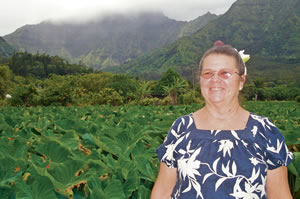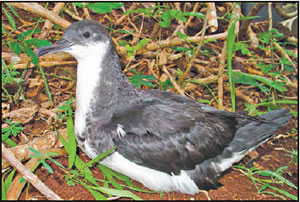Saving The Birds

Maka‘ala Ka‘aumoana: for the love of birds and fishermen. Coco Zickos photo
As the numbers of shearwaters and petrels decline, conservationists step up efforts to protect these native species on Kaua’i from extinction
Maka’ala Ka’aumoana of Hui Ho’omalu I Ka Aina is committed to protecting imperiled native seabirds on their trek from the mountains to the sea.
Guided by the light of the moon, Newell’s shearwaters and Hawaiian petrels taking their inaugural flight become confused by obstacles such as power lines and bright lights.
Ka’aumoana is part of a group of conservationists from a handful of nonprofits intent on mitigating as many of these hindrances as possible.
“They are the fisherman’s partner,” says Ka’aumoana regarding the importance of the birds to native practitioners. “They signal the fish for them they tell them where the fish are.”
When the fledglings take flight from among the highest mountains on Kaua’i, their only instinct is to look for the light of the moon. Any source of bright light can confuse them, causing them to exhaust themselves in flight during a search for the sea, only to eventually fall and face dangers like cars and predators.
Power lines are another source of conflict, as they are barriers to the birds when they attempt to reach the ocean.
Since 1992, Ka’aumoana has been working with others in an effort to evoke Kaua’i Island Utility Cooperative to reduce its impact.

A Kaua‘i Newell’s shearwater. Brenda Zaun/USFWS photo
When the island’s restoration began the year after Hurricane Iniki, members of Hui Ho’omalu I Ka Aina realized it was an opportunity for the co-op to restore power lines in a more bird-friendly manner.
Lowering the height of lines in flyways such as Kealia, Kalihiwai and Hanalei, or planting trees near the wires to conceal them so the birds know to fly over the obstructions, were some of the many suggestions made.
“It could have been as simple as that,” she says.
But despite suggestions, changes did not take place.
“Apparently the cost of wires is more important than the cost of birds,” says Ka’aumoana.
Still, Ka’aumoana continues to voluntarily devote her time encouraging everyone on-island to take care of the once-abundant species.
And recently, her efforts along with those of many others have been paying off.
Lights are being retrofitted on several county facilities on Kaua’i so they are shielded and no longer serve as a false beacon for the birds.
And with representation by Earthjustice, conservationist groups filed a lawsuit last year against KIUC, among them Hui Ho’omalu I Ka Aina. The legal process served as initiation for the U.S. Fish and Wildlife Service to recently issue a permit requiring the co-op to take certain actions, such as lowering its power lines, to help comply with the Endangered Species Act.
“We work hard to give a voice to those that don’t have them,” says Ka’aumoana.
In the last 10 years, the birds’ populations have taken a 75 percent plunge. As opposed to hearing five or six birds’ calls as they flew over her home at night a decade ago, Ka’aumoana now only hears one or two. An environmentalist who devotes much of her time preserving the island’s natural habitats and species, Ka’aumoana says that losing the birds would not only create a cultural impact on traditional practitioners, it would influence the island’s ecology.
“If one fisherman was less able to put dinner on his family’s plate, then that’s enough for me to get involved,” she says.
One of the founding members of Hui Ho’omalu I Ka Aina, Ka’aumoana has been advocating for native practitioners since the 1980s when the organization formed in an effort to stop Hanalei tour boat companies from potentially affecting natural and cultural resources.
“Nobody was speaking for the fisherman, the fish or for the traditional practitioners of the area,” she says. “So the organization stood up.”
The issue is ongoing, as is the concern over the dwindling population of Hawaii’s seabirds.
“We could help the shearwaters recover all of us,” she says about everyone taking necessary precautions such as turning off lights.
“It’s not about who got sued or who is a public agency. We should all take responsibility. This is a species that’s important to this place.”



